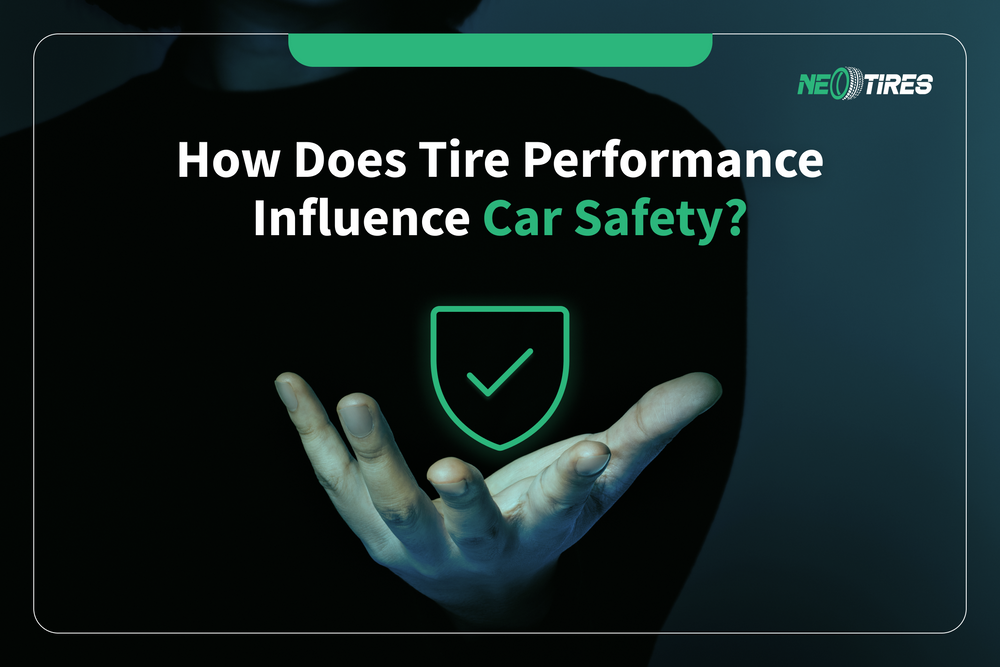You might think: "How could the tire's performance affect the vehicle safety on the road?". In fact, it does affect the quality and safety of driving more than you would have expected. To speak briefly, the turning, braking, and accelerating forces of the vehicle are directly proportional to the quality and performance of your tires. And if you take a moment to delve into this statement, you understand that your entire driving experience actually depends on tires.
The way the car brakes in front of a potential danger, the way it turns to the right or left, the stability you feel (or not) when accelerating - all of them are the result of your tires' performance (or lack of performance).
You literally depend on the 4 contact patches through which your car contacts the road. And if any of these 4 contact patches are not performing enough, what ride safety can we talk about?!
Tire Performance And Safety
Even in the context of the finest roads and smooth turns, the car needs performance tires so that it does not lose its grip on the road. But add to this some ice, snow, or rain on the road, and the vehicle has to face a real challenge. How do you ensure its stability in such conditions? It's not just about a high-performance engine. It is not a question of low body weight either. It is only about performance tires that can face the challenge.
Tires must meet 2 criteria to successfully face different road challenges. The first one refers to the right TIRE pressure. The second refers to the tire tread according to the roads and the conditions in which the vehicle is mostly driving.
Why Is Tire Tread So Important?
To understand the answer better, imagine that you are driving on a wet road, and it's raining cats and dogs. If your tires do not have the right tread for such conditions, you will feel your vehicle aquaplaning on the road. Not only can you lose control of the car, but also the tires are severely damaged in such conditions.
Another example that reflects the need to match tire treads and circumstances around is the cold weather conditions. Ideally, tires preserve a stable grip even in the most wretched conditions. The friction of the road surface during the winter varies with that of the summer. In these circumstances, tires with improper treads do not match the road conditions, posing a threat to the driver's safety. In the same context, the anticipatory properties and steering response to hazards are imminently compromised.
After such a not-very-optimistic introduction, let's take all the aspects in turn. At the same time, we will talk about how we can reduce vehicle safety risks associated with tire performance.
Tires As A Direct Factor Of Car Performance And Handling
Every time a driver is curious about the performance of the car, he takes into account engine torque, transmission, and the amount of horsepower. And he is right to some extent because they really influence everything that refers to the car's performance. However, there is another criterion of influence, namely the tires, which drivers ignore for some reason.
To be even more specific, what impacts car handling is mainly the size and diameter, besides the tread. Whenever they are not suitable for the car, the vehicle handling is prone to collapse. And if you get into the essence, this makes complete sense. As you know, the tire comes into contact with the road only in a small portion. And if the size is not suitable, the driving experience suffers enormously.
Tire Diameter
The common question is whether a larger diameter offers better car handling. In short, yes, the bigger it is, the more stable the car is on the road. Moreover, a larger tire diameter improves the car's braking ability, which is essential in critical situations. A nice bonus is the fact that wide-diameter tires look aesthetically attractive.
However, considering that their sidewall is usually thinner, they are exposed to bending. Either way, it is a good idea to opt for tires with a wider diameter (within the manufacturer's recommendations) to ensure an increased level of stability.
Tire Width
Like the question about diameter, drivers ask themselves if tire width somehow influences car handling. Again, in short: yes. And the most optimal is to opt for tires as wide as possible. The width of the tires contributes to or affects the performance and traction of the vehicle. It all depends on the width you choose. However, this rule is not valid for absolutely all cars, so you should make sure by reading the manufacturers' recommendations.
It is best to opt for the maximum limit recommended by the manufacturers. Going beyond the width limit might jeopardize the driver's safety on the road. Steering becomes more difficult, and overall car handling requires additional effort. For this reason, respect the rigors recommended by the manufacturers, avoiding overlooking the scrub ratio.
Tire Stiffness and its Impact on Vehicle Handling
Another influencing factor on car handling and performance is the stiffness of the tires. You definitely want a ride with safe braking abilities and optimal traction. Also, you want a stable grip, especially in more sophisticated road conditions. For this purpose, you will need softer tires, as the hard ones offer you exactly the opposite.
Despite the benefits of soft tires, you should still know that they are somewhat more prone to early wear. In particular, they are sensitive to rough terrain, deteriorating much faster than average. So, you have to choose the tires according to the circumstances in which they mainly run.
Tread Depth
We mentioned a thing or two about the importance of tire tread patterns on driving safety. However, we want to add something more. It is not difficult for us to reiterate that the tire tread, especially tire depth, is directly responsible for the steering response and traction of your vehicle. The more expressive the depth, the more the vehicle will face extreme conditions such as gravel, sand, snow, mud, and anything of that kind.
Contrastingly, the shallower it is, the more the grip will be compromised. It's as simple as possible: tread thickness is directly proportional to improved traction and braking force. However, the more expressive the tread, the noisier the driving experience. So, choose in such a way as to find the golden mean.
Bottom Line
Keep in mind that choosing the right tires is not just about your own preferences. It mainly depends on the manufacturers' recommendations, which you must take into account. If you want phenomenal traction and grip, that doesn't mean you have to get all-terrain tires for a passenger car. I hope you understand the irony of the example. The idea is that it is advisable to have tires in accordance with the manufacturers' recommendations. These recommendations have in mind the stability and optimal handling of your vehicle.
As you can see, every aspect of your tires influences either positively or negatively your car handling and its performance on the road. Keep them in mind whenever you are looking for new tires. Don't turn your tires exclusively into an aesthetic detail. Their primary purpose is to optimize the driving process and your safety as a driver. Their aesthetic role is also important, but it is an exclusively secondary role.
Tire Performance and Driving Safety: FAQs
How Do Worn Tires Affect Your Safety?
The tire tread is not only an aesthetic element. It is responsible for driving safety, as namely the tread improves contact with the road in various conditions. If it is in poor condition and worn out, grip and traction are significantly reduced. In addition, the braking distance increases considerably, which puts the driver's safety at risk. For this reason, drivers must keep an eye on the condition and depth of the tire tread.
How Do You Keep Tires Safe?
The tires of your vehicle are directly responsible for the way your car drives and your level of safety in it. To ensure safe driving, we recommend that you take into account the following aspects:
- don't ignore the right pressure in your tires. You must check it at least once a month;
- check your tires' condition regularly. Inspect them regularly for damage, signs of wear, or other issues;
- schedule for regular rotation according to the manufacturer's recommendations;
- do not overload the vehicle with additional (and unnecessary) load;
- do not combine different types of tires on the same axle. Ideally, all 4 tires must be identical and correspond to the season and conditions in which you drive.
How Do Tires Affect Driving?
Tires are the "bridge" that connects the body of the vehicle with the road surface. They have a direct impact on the way the vehicle moves, accelerates, corners, or brakes. In addition, your driving experience can be confident or unbalanced, reliable or unreliable, agile or "lazy" - all depending on the condition of your tires. Last but not least, the condition and the tread make the tire safer or, on the contrary, not at all stable in conditions of hydroplaning and harsh snow. For these reasons, you must make sure that the condition of your tires is perfect and corresponds to the standards recommended by the manufacturer.
Why Trust Us?
Even though there are plenty of other great tire dealers on the market, NeoTires has several advantages that could motivate you to keep an eye on us. First of all, we are proud of the experience of over 10 years of each member of the team. No matter if it's mechanics, testers, customer care agents, or content writers, each of them has accumulated enough knowledge in the field of tires to call themselves "high-quality professionals". Secondly, we do our job with passion and dedicate ourselves to the fullest to solve all the issues our customers face.
Thirdly, our goal is not to sell tires, despite many erroneous beliefs. Rather, we are here to propose the right tires for the needs of each driver. We like to think that there are no bad tires, only unsuitable ones. This is our goal - to make the right match.
Needless to mention we keep a close eye on the tire industry's innovations and technologies. We love to self-develop in this field, which helps us offer high-quality service and products to our customers. Yet, we always remain humble and friendly towards our clients because we love that they come back to us. Feel free to contact us with any tire-related concerns and needs. You'll make us happy because we will feel useful for you! Drive safe!





